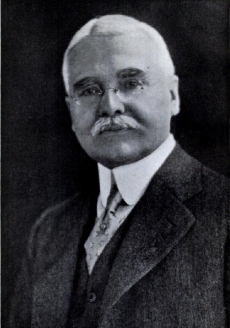Difference between revisions of "Owen Copp"
HerbiePocket (talk | contribs) (Created page with "{{infobox person |name = Owen Copp |image = Copp.jpg |image_size = 230px |caption = |birth_date = |birth_place = |death_date = |death_place = |other_nam...") |
HerbiePocket (talk | contribs) |
||
| Line 1: | Line 1: | ||
{{infobox person | {{infobox person | ||
|name = Owen Copp | |name = Owen Copp | ||
| − | |image = Copp. | + | |image = Copp.png |
|image_size = 230px | |image_size = 230px | ||
|caption = | |caption = | ||
|birth_date = | |birth_date = | ||
|birth_place = | |birth_place = | ||
| − | |death_date = | + | |death_date = Spain |
| − | |death_place = | + | |death_place = June 1933 |
|other_names = | |other_names = | ||
|known_for = Psychiatrist-in-Chief of Pennsylvania Hospital for the Insane | |known_for = Psychiatrist-in-Chief of Pennsylvania Hospital for the Insane | ||
| Line 14: | Line 14: | ||
}} | }} | ||
| + | '''Owen Copp''' was a native of New England, and graduated from Dartmouth College in 1881 and from Harvard Medical School in 1884. One year later, he became a physician at [[Taunton State Hospital]] in Massachusetts. In 1895, he was named the first Superintendent of [[Monson State Hospital]] foe epileptics, and in 1899 he was named Executive Secretary of the Massachusetts Board of Insanity (known today as the Massachusetts Department of Mental Health). He remained in this post until 1911. His achievements in improving the care of the mentally ill in Massachusetts brought him national attention. The [[Pennsylvania Hospital]] took notice and had him appointed as Psychiatrist-in-Chief starting in June of 1911. Another professional victory for Dr. Copp was achieved in 1921, when the [[American Psychiatric Association]] named him president of thier organization. | ||
| + | |||
| + | Dr. Copp’s administration proved transformative for the inpatient hospitals He advocated higher standards in the care for Pennsylvania Hospital's patients. This led almost immediately to the establishment of a specialized nurses’ training school on the hospital’s West Philadelphia campus. In 1914 two training schools opened, one for women and one for men. Simultaneously Dr. Copp began to reduce the duration of patient treatment and the number of in-patients, deciding in many cases that the patient could do better in the familiar surroundings of family and community. This new philosophy was expressed in part in January 1919, when, in response to changing public perceptions of the mentally ill, he prevailed upon the Board of Managers to change the name of the hospital to: the Department of Nervous and Mental Diseases and Pennsylvania Hospital. Dr. Copp was also instrumental in having the term "[[Insanity]]" dropped from clinical literature and from common inpatient use. Copp believed that the term was objectionable and had no place in modern clinical care. The Copp administration was a watershed in the history of the Pennsylvania Hospital. | ||
== Additional Links == | == Additional Links == | ||
| − | + | *[http://www.archives.upenn.edu/histy/features/wphila/exhbts/inst_pa_hosp/ch3sect3.html 112 ACRES OF CHANGE IN THE HEART OF WEST PHILADELPHIA] | |
[[Category:Historical People]] | [[Category:Historical People]] | ||
Revision as of 13:52, 7 March 2013
| Owen Copp | |
|---|---|
 | |
| Died | Spain June 1933 |
| Nationality | American |
| Occupation | Physician |
| Known for | Psychiatrist-in-Chief of Pennsylvania Hospital for the Insane |
Owen Copp was a native of New England, and graduated from Dartmouth College in 1881 and from Harvard Medical School in 1884. One year later, he became a physician at Taunton State Hospital in Massachusetts. In 1895, he was named the first Superintendent of Monson State Hospital foe epileptics, and in 1899 he was named Executive Secretary of the Massachusetts Board of Insanity (known today as the Massachusetts Department of Mental Health). He remained in this post until 1911. His achievements in improving the care of the mentally ill in Massachusetts brought him national attention. The Pennsylvania Hospital took notice and had him appointed as Psychiatrist-in-Chief starting in June of 1911. Another professional victory for Dr. Copp was achieved in 1921, when the American Psychiatric Association named him president of thier organization.
Dr. Copp’s administration proved transformative for the inpatient hospitals He advocated higher standards in the care for Pennsylvania Hospital's patients. This led almost immediately to the establishment of a specialized nurses’ training school on the hospital’s West Philadelphia campus. In 1914 two training schools opened, one for women and one for men. Simultaneously Dr. Copp began to reduce the duration of patient treatment and the number of in-patients, deciding in many cases that the patient could do better in the familiar surroundings of family and community. This new philosophy was expressed in part in January 1919, when, in response to changing public perceptions of the mentally ill, he prevailed upon the Board of Managers to change the name of the hospital to: the Department of Nervous and Mental Diseases and Pennsylvania Hospital. Dr. Copp was also instrumental in having the term "Insanity" dropped from clinical literature and from common inpatient use. Copp believed that the term was objectionable and had no place in modern clinical care. The Copp administration was a watershed in the history of the Pennsylvania Hospital.